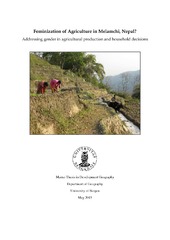| dc.description.abstract | This thesis is based on two months of fieldwork in Melamchi, Nepal in 2014. The objective of this study is to examine whether a feminization of agriculture" has occurred in the study area by investigating the local farming system and the gendered division of agricultural labour and managerial responsibilities. According to the household survey (n=54), a strong gendered division of agricultural tasks exist in this area, thus men and women have clear responsibilities and restrictions. By the use of various fieldwork methods it was discovered that women in some cases have to take on tasks that are generally considered men's work". Women are in charge of various managerial decisions related to the agricultural production, but any major decisions are still controlled by men. Decisions concerning how to spend the household income are made by men alone in 67 % of the households. The real influence of women as decision-makers can therefore be questioned. The influence of factors like education, caste and ethnicity and access to financial services has also been discussed. I argue that a feminization of labour does not ensure a strengthening of women's position in the household, rather, if women get more work and no influence in decision-making processes the feminization of agriculture" is just a form of exploitation. An attempt has been made to explain how the authority of the decision-maker obtains legitimacy in patriarchal households in Melamchi. In order to do this, Weber's theory of domination and the description of the ideal type traditional authority have been used. According to informants, parampara (tradition) is the main reason why men legitimately dominate decision-making processes. Therefore traditional authority is relevant in this case. I argue that social structural like virilocality and patrilineality should be included in the definition of traditional authority. Ecofeminists argue that if women could choose freely, they would grow subsistence cultivation with high biodiversity in order to feed their families and take care of nature. Even though women were often found to be in charge of the cultivation of vegetables and subsistence farming, this cannot be seen as a sign on their affection towards nature. Women expressed a wish for more intensively driven production in order to increase the household's income, just like their male counterparts. I therefore argue that women are not more concerned with the small-scale, subsistence farming, rather that they have been confined to it. | en_US |
